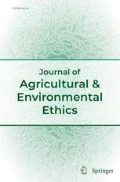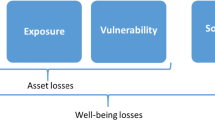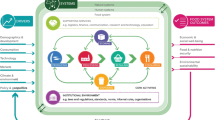Abstract
Recent publications by Pogge (Global ethics: seminal essays. St. Paul: Paragon House 2008) and by Singer (The life you can save: acting now to end world poverty. New York: Random House 2009) have resuscitated a debate over the justifiability of famine relief between Singer and ecologist Garrett Hardin in the 1970s. Yet that debate concluded with a general recognition that (a) general considerations of development ethics presented more compelling ethical problems than famine relief; and (b) some form of development would be essential to avoiding the problems of growth noted by Hardin. Better than renewing the debate, we should recognize two points. First, food needs do indeed evoke a moral response that is more direct and compelling than the philosophical positions often generated to rationalize a duty to bring aid. As such the argument for feeding hungry people cannot be generalized into a paradigm for development ethics without distortions that undercut the morally valid elements in Singer’s original argument. Second, contrary to prevailing assumptions in present day development ethics, food aid and famine relief continue to be important priorities for international agencies, notably the World Food Program. Emergency food assistance, the nominal topic of Singer’s original article, thus is an important issue for agricultural as well as development ethics, though one that should indeed be seen as distinct from more complex duties to address the conditions of chronic poverty and underdevelopment.
Similar content being viewed by others
References
Ashford, E. (2007). The duties imposed by the human right to basic necessities. In T. Pogge (Ed.), Freedom from poverty as a human right: Who owes what to the very poor? (pp. 183–218). New York: Oxford University Press.
Barrett, C. B., & Maxwell, D. G. (2005). Food aid after fifty years: Recasting its role. London: Routledge.
Camacho, L. (2008). Agriculture intensification from the perspective of development ethics. In P. B. Thompson (Ed.), The ethics of intensification: Agricultural development and cultural change (pp. 97–110). Dordrecht, NL: Springer.
Clay, E. (1991). Food aid, development and food security. In C. P. Timmer (Ed.), Agriculture and the state: Growth, employment and poverty in developing countries (pp. 202–236). Ithaca, NY: Cornell University Press.
Cohen, A. I. (2005). Famine relief and human virtue. In A. I. Cohen & C. H. Wellman (Eds.), Contemporary debates in applied ethics (pp. 326–342). New York: Blackwell.
Crocker, D. A. (2008). Ethics of global development: Agency, capability, and deliberative democracy. Cambridge, UK: Cambridge University Press.
Drèze, J., & Sen, A. (1989). Hunger and political action. Oxford: Oxford University Press.
Fiske, A. P. (1998). Human sociality. International Society for the Study of Personal Relationships Bulletin, 14(2), 4–9.
Greene, J. (2005). Emotion and cognition in moral judgment: Evidence from neuroimaging. In J.-P. Changeux, A. R. Damasio, W. Singer, & Y. Christen (Eds.), Neurobiology of human values (pp. 57–66). Dordrecht, NL: Springer.
Hardin, G. (1974). Lifeboat ethics: The case against helping the poor. Psychology Today Magazine, 8(September), 38–43, 123–126.
Hopkins, R. F. (1993). Reforming food aid for the 1990’s. In V. W. Ruttan (Ed.), Why food aid? (pp. 200–215). Baltimore, MD: Johns Hopkins University Press.
Keyser, M. A., & van Wesenbeek, L. (2007). Food aid and governance. In E. Bulte & R. Ruben (Eds.), Development economics between markets and institutions: Incentives for growth, food security and sustainable use of the environment (pp. 183–208). Wageningen, NL: Wageningen.
Lafollette, H. (2003). World hunger. In R. Frey & C. Wellman (Eds.), A companion to applied ethics (pp. 238–253). Oxford: Blackwell.
LaFollette, H., & May, L. (1996). Suffer the little children. In W. Aiken & H. LaFollette (Eds.), World hunger and morality (pp. 70–84). Upper Saddle River, NJ: Prentice-Hall.
Mazoyer, M., & Roudart, L. (2006). A history of world agriculture from the neolithic age to the current crisis, (trans: Membrez, J. H.). London: Earthscan.
Miller, R. W. (2004). Beneficence, duty and distance. Philosophy and Public Affairs, 32, 357–383.
Pogge, T. (2002). World poverty and human rights: Cosmopolitan responsibilities and reforms. Cambridge, UK: Polity Press.
Pogge, T., & Horton, K. (Eds.). (2008). Global ethics: Seminal essays. St. Paul, MN: Paragon House.
Rawls, J. (1993). The law of peoples. Critical Inquiry, 20, 36–68.
Ruttan, V. W. (1993a). The politics of US food aid policy: A historical review. In V. W. Ruttan (Ed.), Why food aid? (pp. 2–36). Baltimore, MD: Johns Hopkins University Press.
Ruttan, V. W. (1993b). Does food aid have a future? In V. W. Ruttan (Ed.), Why food aid? (pp. 216–228). Baltimore, MD: Johns Hopkins University Press.
Schulz, T. W. (1960). Value of US farm surpluses to underdeveloped countries. Journal of Farm Economics, 42, 1019–1030.
Sen, A. (1981). Poverty and famines: An essay on entitlement and deprivation. Oxford: Oxford University Press.
Shue, H. (1980). Basic rights: Subsistence, affluence and US foreign policy. Princeton, NJ: Princeton University Press.
Singer, P. (1972). Famine, affluence and morality. Philosophy and Public Affairs, 1, 229–243.
Singer, P. (1993). Practical ethics (2nd ed.). Cambridge: Cambridge University Press.
Singer, P. (2009). The life you can save: Acting now to end world poverty. New York: Random House.
Taylor, P. J. (2005). Unruly complexity: Ecology, interpretation and engagement. Chicago: University of Chicago Press.
Thompson, E. P. (1971). The moral economy of the English crowd in the 18th century. Past & Present, 50, 76–136.
Thompson, P. B. (1992). The ethics of aid and trade: US food policy, foreign competition and the social contract. Cambridge: Cambridge University Press.
Timmer, C. P. (1986). Getting prices right: The scope and limits of agricultural price policy. Ithaca, NY: Cornell University Press.
USDA (United States Department of Agriculture) (2009). International Food Aid Conference. Online at: http://www.fsa.usda.gov/FSA/webapp?area=home&subject=coop&topic=pai-fa. Accessed March 19, 2009.
Wellman, C. H. (2005). Famine relief: The duties we have to others. In A. I. Cohen & C. H. Wellman (Eds.), Contemporary debates in applied ethics (pp. 313–325). New York: Blackwell.
WFP (World Food Program) (2007). Annual report 2007. Rome: World Food Program.
WFP (World Food Program) (2009). World Food Program hands out ready-to-eat meals in Gaza. Online: http://www.wfp.org/news/news-release/wfp-hands-out-ready-eat-meals-hungry-gaza. Accessed March 20, 2009.
Zerbe, N. (2004). Feeding the famine? American food aid and the GMO debate in Southern Africa. Food Policy, 29, 593–608.
Author information
Authors and Affiliations
Corresponding author
Rights and permissions
About this article
Cite this article
Thompson, P.B. Food Aid and the Famine Relief Argument (Brief Return). J Agric Environ Ethics 23, 209–227 (2010). https://doi.org/10.1007/s10806-009-9181-6
Accepted:
Published:
Issue Date:
DOI: https://doi.org/10.1007/s10806-009-9181-6




